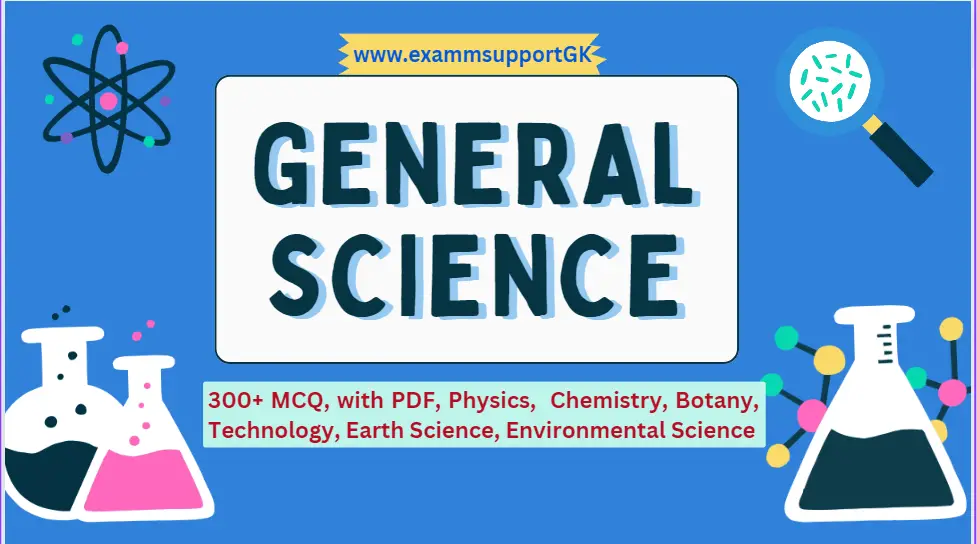General science GK
General science refers to the basic principles and concepts across various branches of science that are commonly taught at an introductory level. It is an interdisciplinary field that covers fundamental aspects of subjects like physics, chemistry, biology, earth science, and environmental science. General science provides a foundational understanding of how the natural world works and serves as the basis for more specialized scientific studies.

General science GK
Key Components of General Science:
- Physics:
- Chemistry:
- Biology:
- Earth Science:
- Environmental Science:
- Technology
Importance of General Science:
- Foundation for Advanced Learning: General science provides the foundational knowledge necessary for more specialized and advanced studies in any specific scientific field.
- Everyday Application: Basic scientific knowledge is essential for understanding everyday phenomena, such as why seasons change, how electricity powers devices, and how the human body functions.
- Critical Thinking: Learning general science encourages critical thinking and problem-solving skills, as it involves observing, hypothesizing, experimenting, and drawing conclusions based on evidence.
- Informed Citizenship: An understanding of science helps individuals make informed decisions about health, environment, and technology, and to understand scientific discussions that affect society.
- Career Preparation: A basic understanding of general science is essential for various careers, not only in science and technology but also in fields like medicine, engineering, and education.
General science GK
Physics General Knowledge
1. What is the unit of force?
a) Joule
b) Watt
c) Newton
d) Pascal
Answer: c) Newton
2. Which law states that “for every action, there is an equal and opposite reaction”?
a) Newton’s First Law
b) Newton’s Second Law
c) Newton’s Third Law
d) Law of Gravitation
Answer: c) Newton’s Third Law
3. What is the speed of light in a vacuum?
a) 3 × 10^6 m/s
b) 3 × 10^8 m/s
c) 3 × 10^10 m/s
d) 3 × 10^12 m/s
Answer: b) 3 × 10^8 m/s
4. Who discovered the law of gravitation?
a) Albert Einstein
b) Isaac Newton
c) Galileo Galilei
d) James Clerk Maxwell
Answer: b) Isaac Newton
5. What is the unit of electrical resistance?
a) Ohm
b) Volt
c) Ampere
d) Coulomb
Answer: a) Ohm
6. Which of the following is a scalar quantity?
a) Velocity
b) Force
c) Speed
d) Acceleration
Answer: c) Speed
7. What is the SI unit of energy?
a) Joule
b) Watt
c) Calorie
d) Volt
Answer: a) Joule
8. Which of the following is a vector quantity?
a) Mass
b) Temperature
c) Displacement
d) Time
Answer: c) Displacement
9. What type of wave is sound?
a) Transverse wave
b) Longitudinal wave
c) Electromagnetic wave
d) Mechanical wave
Answer: b) Longitudinal wave
10. What is the unit of frequency?
a) Hertz
b) Newton
c) Joule
d) Tesla
Answer: a) Hertz
General science GK
11. Which phenomenon explains the bending of light as it passes from one medium to another?
a) Reflection
b) Refraction
c) Diffraction
d) Polarization
Answer: b) Refraction
12. Who proposed the theory of relativity?
a) Niels Bohr
b) Isaac Newton
c) Albert Einstein
d) Marie Curie
Answer: c) Albert Einstein
13. What is the acceleration due to gravity on Earth?
a) 8.9 m/s^2
b) 9.8 m/s^2
c) 10.8 m/s^2
d) 11.8 m/s^2
Answer: b) 9.8 m/s^2
14. What is the unit of power?
a) Joule
b) Watt
c) Newton
d) Ampere
Answer: b) Watt
15. Which of the following is not a fundamental force of nature?
a) Gravitational Force
b) Electromagnetic Force
c) Weak Nuclear Force
d) Frictional Force
Answer: d) Frictional Force
16. What device is used to measure electric current?
a) Voltmeter
b) Ammeter
c) Ohmmeter
d) Galvanometer
Answer: b) Ammeter
17. Which of the following is the unit of magnetic flux?
a) Tesla
b) Weber
c) Henry
d) Farad
Answer: b) Weber
18. What is the law of conservation of energy?
a) Energy can be created but not destroyed.
b) Energy can be destroyed but not created.
c) Energy cannot be created or destroyed, only transformed.
d) Energy is always increasing in a closed system.
Answer: c) Energy cannot be created or destroyed, only transformed.
19. What is the phenomenon where light splits into its component colors?
a) Reflection
b) Refraction
c) Dispersion
d) Diffraction
Answer: c) Dispersion
20. Which of the following particles is negatively charged?
a) Proton
b) Neutron
c) Electron
d) Photon
Answer: c) Electron
General science GK
21. What is the first law of thermodynamics?
a) Energy cannot be created or destroyed.
b) The entropy of a closed system always increases.
c) For every action, there is an equal and opposite reaction.
d) The pressure of a gas is proportional to its temperature.
Answer: a) Energy cannot be created or destroyed.
22. Who discovered the electron?
a) J.J. Thomson
b) Ernest Rutherford
c) Niels Bohr
d) James Chadwick
Answer: a) J.J. Thomson
23. What is the SI unit of pressure?
a) Pascal
b) Bar
c) Newton
d) Joule
Answer: a) Pascal
24. What is the device used to measure atmospheric pressure?
a) Thermometer
b) Barometer
c) Hydrometer
d) Hygrometer
Answer: b) Barometer
25. Which law states that the volume of a gas is inversely proportional to its pressure at constant temperature?
a) Boyle’s Law
b) Charles’s Law
c) Avogadro’s Law
d) Dalton’s Law
Answer: a) Boyle’s Law
General science GK
Important Topics:
Quiz:
Sorry for the typing. I hope you will correct me in the comment box.